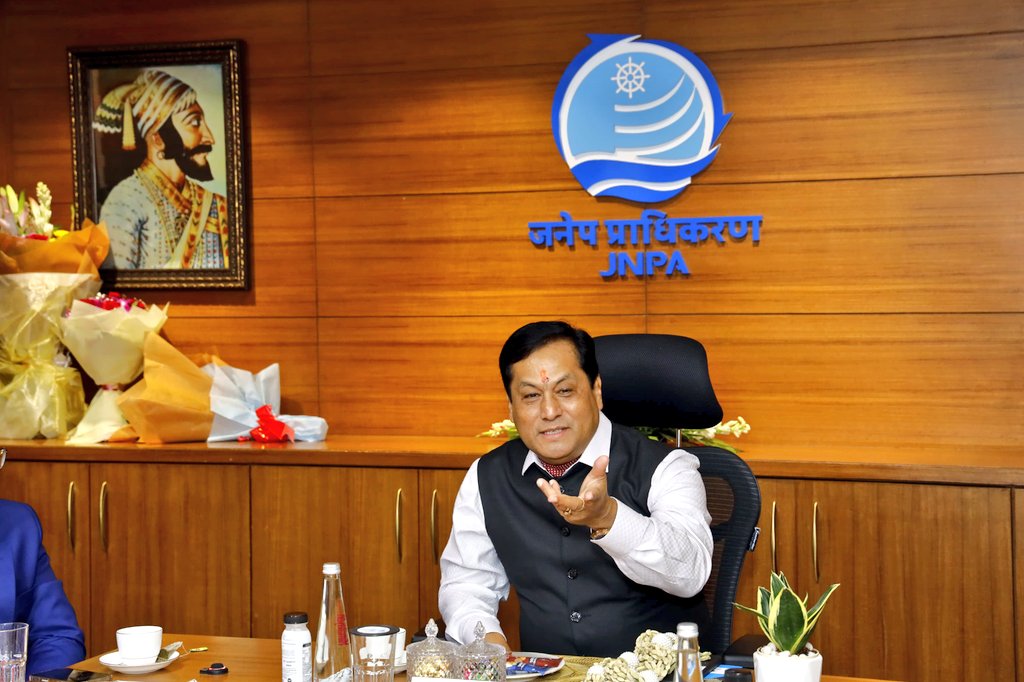India and Japan Deepen Maritime Cooperation, Eye Joint Shipbuilding, Smart Ports
“We see immense scope for collaboration, particularly in deploying sustainable technologies and developing disaster-resilient infrastructure to transform these islands into global models of smart, green maritime ecosystems,” said Shri Sonowal.

- Country:
- India
In a significant stride toward enhancing bilateral maritime cooperation, Union Minister of Ports, Shipping & Waterways, Shri Sarbananda Sonowal, held a high-level bilateral meeting with His Excellency Terada Yoshimichi, Japan’s Vice Minister for International Affairs at the Ministry of Land, Infrastructure, Transport & Tourism (MLITT). The meeting took place in Oslo, on the sidelines of an international maritime forum, and focused on unlocking strategic synergies in maritime investment, green infrastructure, shipbuilding, and human capital development.
The dialogue emphasized expanding maritime collaboration between India and Japan, particularly in areas such as:
-
Investment by Japanese shipyards in India
-
Collaboration on port digitization and green port initiatives
-
Development of Smart Islands in Indian territories
-
Upskilling and employment of Indian seafarers in Japan
-
Joint ventures in sustainable shipbuilding
-
Maritime industrial cluster development
-
Research and development in next-generation maritime technology
Strengthening Maritime Relations Through Shared Innovation
Opening the discussions, Shri Sonowal expressed India’s desire to harness Japan’s technical expertise and investment capabilities to advance the country’s maritime transformation under the ‘Maritime India Vision 2030’ and ‘Amrit Kaal Vision 2047’. He noted that Japan’s reputation in maritime innovation, shipbuilding, and smart port design positions it as an ideal partner.
Particular interest was shown in leveraging Japanese know-how to develop Smart Islands in Andaman & Nicobar and Lakshadweep, with a focus on renewable energy, smart mobility systems, and digital infrastructure. “We see immense scope for collaboration, particularly in deploying sustainable technologies and developing disaster-resilient infrastructure to transform these islands into global models of smart, green maritime ecosystems,” said Shri Sonowal.
Inviting Japanese Investment in Shipbuilding and Port Development
Discussions included Japan’s major shipbuilding firms such as Imabari Shipbuilding, JMUC, Kanagawa Dockyard, and Mitsubishi Heavy Industries. India has extended invitations for Greenfield investments in states like Andhra Pradesh, where shipbuilding capacity is being scaled rapidly. These discussions also explored the co-development of ports and creation of maritime industrial clusters, with a strong emphasis on clean energy hubs and logistics optimization.
Shri Sonowal emphasized, “India welcomes Japan’s shipbuilding giants and maritime logistics leaders like NYK Line, MOL, and K Line to explore joint ventures in our thriving maritime market.”
Training, Employment, and the Human Capital Corridor
India currently trains and maintains a strong workforce of over 154,000 certified seafarers, a large segment of whom are well-positioned for employment in Japan’s maritime industry. Shri Sonowal suggested building a structured training framework, facilitated by Japanese maritime leaders, to upskill and integrate Indian maritime professionals into Japan’s maritime ecosystem.
“We see this as a dual opportunity—to support Japan’s aging workforce challenges and to empower India’s growing maritime talent through world-class training and global exposure,” he stated.
Towards a Maritime Knowledge Partnership
India also expressed strong interest in collaborating with Japanese universities and agencies on research and development, next-gen ship design, and sustainable maritime technologies. A proposal was made for a Memorandum of Understanding (MoU) to facilitate cooperation between Cochin Shipyard Limited (CSL), Indian academic institutions, and Japanese maritime agencies.
India-Japan Synergy in Heritage and Policy
An additional highlight of the meeting was India’s proposal for Japan’s involvement in the National Maritime Heritage Museum (NMHC) being developed at Lothal, Gujarat. Intended to serve as a global center for maritime heritage tourism, education, and research, the museum seeks Japan’s partnership in both design and content collaboration.
Further, the Union Minister extended a formal invitation to Vice Minister Terada Yoshimichi to participate in the India Maritime Week 2025, scheduled to be held in Mumbai from October 27–31, where global stakeholders will converge to explore opportunities for collaboration and innovation in the maritime domain.
A Strategic Convergence of Visions
Vice Minister Terada Yoshimichi affirmed Japan’s growing interest in India’s maritime transformation, acknowledging India as a vital partner in the Indo-Pacific region. “While Japan has long been involved in India’s railway infrastructure, our attention is now turning toward the maritime sector,” he said. Japan's representatives expressed satisfaction with the outcomes of the meeting, particularly in areas of shipbuilding cooperation, maritime training, and smart port development.
Both nations also committed to advancing Quad cooperation and joint participation in Supply Chain Resilience Initiatives (SCRI) under the India-Japan-Australia partnership, promoting economic integration and maritime security in the Indo-Pacific.
Commitment to Shared Maritime Prosperity
Post-meeting, Shri Sarbananda Sonowal reaffirmed the enduring nature of Indo-Japanese maritime ties, built on mutual trust, shared democratic values, and civilizational heritage. He stated, “India aims to achieve 5 trillion yen (₹3.2 lakh crore) in investments from Japan by 2027, and the maritime sector will be a key contributor to this vision.”
He concluded by highlighting India’s emergence as a key maritime power and a hub of innovation, reiterating the nation’s commitment to inclusive, sustainable, and technologically advanced maritime growth.
- READ MORE ON:
- India-Japan relations
- maritime cooperation
- Sarbananda Sonowal
- Terada Yoshimichi
- shipbuilding India
- green ports
- smart islands
- seafarer training
- Maritime India Vision
- India Maritime Week 2025
- Cochin Shipyard
- NMHC Lothal
- Japanese investment
- Indo-Pacific maritime security
- digital ports India










